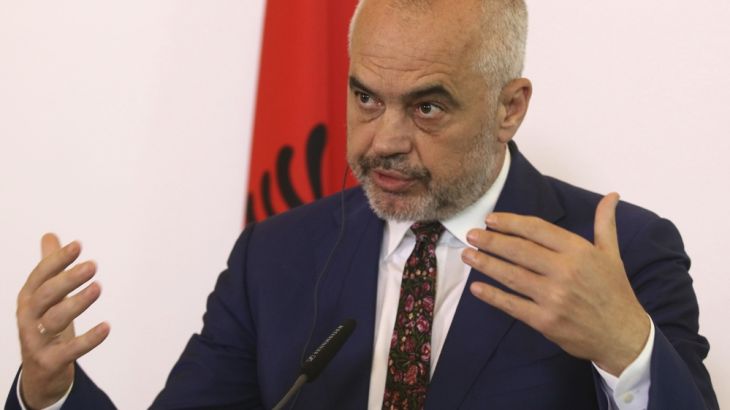
PM Edi Rama on elections: ‘Albania is not ready to join the EU’
Prime Minister Edi Rama discusses Albania’s political crisis and why he thinks the country is not ready to join the EU.
Albania‘s overarching national goal is to join the European Union.
But Prime Minister Edi Rama does not think the country is ready for membership, partly because its political institutions are seen as underdeveloped.
Keep reading
list of 4 itemsJacob Zuma’s nine lives: How South Africa’s ex-president keeps coming back
A flash flood and a quiet sale highlight India’s Sikkim’s hydro problems
Ruling HDZ party wins most seats, but no majority in Croatia election
That has been on display in the past week as political parties have disagreed on when to hold nationwide local elections.
They were scheduled for June 30, but the opposition Democratic Party now wants that date pushed back and has not fielded mayoral candidates.
The ruling Socialists of Edi Rama want to proceed regardless with the candidates they have registered.
The deadlock is part of a growing political crisis; in February, the opposition Democratic Party withdrew from parliament and supporters took to organising in the streets.
Weeks of anti-government protests have called for Rama to step down, accusing him of corruption and election fraud, and early elections.
In an interview with Al Jazeera, Rama said that changing the election date would, in fact, undermine Albania’s democracy. President Ilir Meta had cancelled the elections, stating that current conditions do not allow for a fair and inclusive process and would undermine accession talks with the EU.
If I turn my head five years and a half ago and I see from where we come, we have done impressively. But if I see forward, where we want to go and where I am to bring the country, there is much more to do.
“It’s not what Albania deserves and it’s not what the future is about. Because if we set a precedent that a party, two parties, three parties, one side, decide to impose the disruption and election terms can be decided upon disruption then we will have it for many years to come,” Rama said.
“In the end, elections are not made for the politicians to decide, it’s made for the people to decide about the politicians … Escaping this judgement or transforming this very basic element of our democratic life, it means going in a direction which is not our future, it’s a past.”
WATCH: President Ilir Meta: Decision to cancel Albania polls ‘cannot be contested’
Still, the deadlock has added to scepticism in the EU about whether Albania is ready to join it.
A 2019 European Commission report states that Albania has made important reforms but still must work to address issues such as corruption and organised crime. It says corruption is still “prevalent in many areas and remains an issue of concern”.
Rama acknowledges the problem.
“I think Albania has a problem with organised crime and corruption as every country that is not yet a modern, functioning state. That’s why we are in this process, that’s why we are not members of EU, or that’s why I am not pretending that it’s an injustice that we are not members today. We need to prepare, we need to modernise, and fighting corruption and fighting organised crime is about very strong will, but it’s about very strong institutions and very strong mechanisms and functioning in every direction,” he said.
He says there is a lot of work to be done.
“If I turn my head five years and a half ago and I see from where we come, we have done impressively. But if I see forward, where we want to go and where I am to bring the country, there is much more to do.”
He maintains that if accession talks are successful, both Albania and the EU will benefit.
“Albania and the western Balkans are surrounded by EU borders so we are somehow an organ of a body that is dragging out of the body, but is not simply fading away but it is there. So the choice is very simple; let this organ bleed and create troubles to the whole body … or help this organ to integrate and help the body to get the organ in,” he said.
“So it’s not about enlargement, it’s about completion, it’s about a very important piece of the puzzle …. [It is] an area … within the European Union that should not be left as an open space for other actors that may not be very keen to see the European Union progress and prosper.”